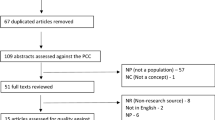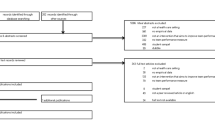Abstract
In a recent study we found that testing as a final activity in a skills course increases the learning outcome compared to spending an equal amount of time practicing. Whether this testing effect measured as skills performance can be demonstrated on long-term basis is not known. The research question was: does testing as a final activity in a cardio-pulmonary resuscitation (CPR) skills course increase learning outcome when assessed after half a year, compared to spending an equal amount of time practicing? The study was an assessor-blinded randomised controlled trial. A convenient sample of 7th semester medical students attending a mandatory CPR course was randomised to intervention course or control course. Participants were taught in small groups. The intervention course included 3.5 h skills training plus 30 min of skills testing. The practice-only control course lasted 4 h. Both groups were invited to a retention assessment of CPR skills half a year later. Participants included 89/180 (50%) of those invited to participate in the study. Mean performance score was 75.9 (SD 11.0) in the intervention group (N = 48) and 70.3 (SD 17.1) in the control group, effect size 0.4. The difference between groups was not statistically significant, P = 0.06. This study suggests that testing as a final activity in a CPR skills course might have an effect on long-term learning outcome compared to spending an equal amount of time practicing the skills. Although this difference was not statistically significant, the identified effect size of 0.4 can have important clinical and educational implications.

Similar content being viewed by others
References
Bangert-Drowns, R. L., & Kulik, J. (1991). Effects of frequent classroom testing. The Journal of Educational Research, 85(2), 89–99.
Berden, H. J., Willems, F. F., Hendrick, J. M., & Pijls, N. H. (1993). How frequently should basic cardiopulmonary resuscitation training be repeated to maintain adequate skills. British Medical Journal, 306(6892), 1576–1577.
Callahan, C., Hojat, M., & Gonnella, J. (2007). Volunteer bias in medical education research: an empirical study of over three decades of longitudinal data. Medical Education, 41(8), 746–753.
Carney, P. A., Nierenberg, D. W., Pipas, C. F., Brooks, W. B., Stukel, T. A., & Keller, A. M. (2004). Educational epidemiology applying population-based design and analytic approaches to study medical education. Journal of the American Medical Association, 292(9), 1044–1050.
Hojat, M., & Xu, G. (2004). A visitor’s guide to effect sizes—statistical significance versus practical (clinical) importance of research findings. Advances in Health Sciences Education, 9(3), 241–249.
Jensen, M., Hesselfeldt, R., Rasmussen, M., Mogensen, S., Frost, T., Jensen, M., et al. (2008). Newly graduated doctors’ competence in managing cardiopulmonary arrests assessed using a standardized advanced life support (als) assessment. Resuscitation, 77(1), 63–68.
Jensen, M. L., Mondrup, F., Lippert, F., & Ringsted, C. (2009). Using e-learning for maintenance of ALS competence. Resuscitation, 80(8), 903–908.
Kromann, C., Jensen, M. L., & Ringsted, C. (2009). The testing effect in skills learning. Medical Education, 43(1), 21–27.
Magill, R. A. (2006). Demonstration and verbal instruction. Motor learning and control: Concepts and applications (pp. 306–330). NY: McGraw-Hill.
Ringsted, C., Lippert, F., & Hesselfeldt, R. (2007). “Assessment of advanced life support competence when combining different test methods.” Resuscitation, 75(1), 153–160.
Roediger, H. L., & Karpicke, J. D. (2006). The power of testing memory: Basic research and implications for educational practice. Perspectives on Psychological Science, 1(3), 181–276.
Wik, L. (2003). Rediscovering the importance of chest compressions to improve the outcome from cardiac arrest. Resuscitation, 58(3), 267–269.
Woollard, M., Whitfield, R., Newcombe, R., Colquhoun, M., Vetter, N., & Chamberlain, D. (2006). Optimal refresher training intervals for AED and CPR skills: A randomised controlled trial. Resuscitation, 71(2), 237–247.
Acknowledgments
This study was financially supported by the Centre for Clinical Education and in part funded by Trygfonden.
Author information
Authors and Affiliations
Corresponding author
Rights and permissions
About this article
Cite this article
Kromann, C.B., Bohnstedt, C., Jensen, M.L. et al. The testing effect on skills learning might last 6 months. Adv in Health Sci Educ 15, 395–401 (2010). https://doi.org/10.1007/s10459-009-9207-x
Received:
Accepted:
Published:
Issue Date:
DOI: https://doi.org/10.1007/s10459-009-9207-x




